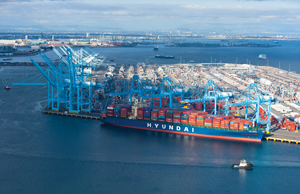
After a warning last week that a potential shutdown at West Coast sea ports could be just days away, some harbor businesses started telling clients to hunker down and prepare for the worst.
The Pacific Maritime Association, which represents global shipping companies and port terminal operators in negotiations with the dockworkers’ union, warned a coast-wide shutdown – caused by a lockout or by sheer gridlock at the already congested ports – is likely.
With a shutdown looming, one local company went so far as to tell clients to keep cargo off the water until the storm had passed.
Freight forwarder Norman Krieger Inc. in Carson sent a notice to clients advising them not to have any cargo shipped to West Coast ports because of the likelihood of a shutdown.
“It is not recommended to put any containers on the water for delivery to the West Coast, if possible, until the situation becomes more clear,” the notice read.
Other firms, though, aren’t taking such drastic steps and saw last week’s warning as a bargaining tactic, the latest strategic move in the association’s months-long negotiations with the International Longshore and Warehouse Union.
“I feel it’s a little bit of saber rattling on the PMA’s part, and I don’t know what the union will do,” said Roger Clarke, president of Wilmington freight forwarder Williams Clarke Company Inc.
Clarke said his clients were already sending shipments to ports other than those on the West Coast because of months of congestion. But he’s staying clear of advising clients to not ship their orders.
“If you don’t ship, you could lose business,” Clarke said. “We’re still moving cargo; it’s just at a slow pace.”
Warning
The shipping association’s warning came during a Feb. 4 conference call, the association’s most public step so far in airing details of contract negotiations, which began in May. James McKenna, the group’s chief executive, said a coast-wide lockout was nearly inevitable, perhaps as soon as Feb. 9.
For local firms that rely on the ports of Los Angeles and Long Beach for importing and exporting products, the warning of a potential shutdown added more pain to injuries they’ve been enduring for months. Congestion at the ports has been a problem for months. A shutdown could further hold up shipments that have already been delayed by weeks.
“We’re very concerned; we’re taking it seriously,” said Martin Ploy, president of Pico Rivera furniture designer and manufacture Aico/Amini Innovation Corp.
He said the company has about $4.5 million worth of goods sitting in about 70 containers that are stuck either on overcrowded port terminals or on ships waiting to dock.
Amini risks losing credibility with customers who ordered its furniture from retail stores but are still waiting for delivery, Ploy said. Customers don’t know whether it’s the fault of the retail store, Amini or the congestion at the ports.
McKenna’s discussion of contract negotiations in the conference call also outlined details on wage and pension increases and other aspects of its current contract offer to the union, breaking a historical agreement between union members and employers that such specifics were kept private during the collective bargaining process.
Disclosing the negotiating points was likely just another tactic, business owners said. The details, such as a 3 percent yearly increase to average annual salaries of $147,000 and a bump in pension payouts to $88,000 a year, were likely released by the association to try to make the union look unreasonable for apparently not accepting them, said Richard Wortman, a partner in the Los Angeles office of New York law firm Grunfeld Desiderio Lebowitz Silverman & Klestadt, which specializes in customs and international trade.
“This may well be that they’re trying to garner sympathy,” he said. “I think that the PMA was drawing its line in the sand. They’re putting out objective information and trying to do a public relations piece with the importing public.”
Whatever the association’s motive for the warning and disclosures, ILWU spokesman Craig Merrilees was unfazed, saying that only a few issues remain to be settled and the differences are narrowing, hinting that, despite the association’s warning, a resolution was around the corner.
“An agreement is going to be reached between the folks in the room and not through press releases, YouTube videos or conference calls,” Merrilees said.
